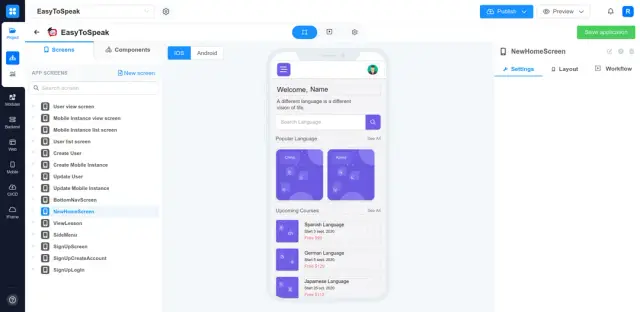Low-Code and the Rise of Citizen Developers
Explore the emergence of low-code development platforms, their role in creating citizen developers, and how this is reshaping the software development industry. Discover how AppMaster.io enables individuals to build business applications with ease.

What is Low-Code Development?
Low-code development is an approach to building software applications using visual tools, reusable components, and pre-built templates, with minimal traditional hand-coding. This enables developers to focus on the application's business logic and functionality, rather than the technical details often associated with traditional application development.
Low-code platforms provide a visual interface for designing, building, and deploying applications. These platforms generally include a wide range of pre-built components that simplify the development and integration processes, making it easier for developers to create customized applications rapidly.
Additionally, low-code platforms often provide tools for automating testing, deployment, and scaling of applications, which can help reduce the overall cost and complexity involved in software development.
The Emergence of Citizen Developers
As organizations strive to accelerate their digital transformation efforts, the demand for custom software applications is on the rise. However, the inherent complexities of software development have long been a barrier for non-technical employees, who often have the domain knowledge and insights but lack the programming skills necessary to develop applications. This is where citizen developers come into the picture.
A citizen developer is a non-technical individual or business user who creates applications using low-code or no-code platforms without the need for extensive programming expertise. By harnessing the power of low-code platforms, these citizen developers can build applications that address specific business needs, bridge the gap between IT and business teams, and contribute to the organization's overall software development efforts.

The rise of citizen developers has been fueled by several factors:
- Increasing demand for custom applications to address evolving business needs.
- The ongoing shortage of skilled software developers and the growing IT backlog.
- The availability of low-code platforms that enable rapid application development with little or no coding knowledge.
- The desire for a more agile and collaborative approach to software development, which involves a broader range of stakeholders.
Benefits of Low-Code Development
Low-code development platforms have emerged as compelling tools for empowering citizen developers, while also providing several potential benefits for organizations:
- Accelerated development and deployment: Low-code platforms simplify and streamline the application development process by providing a range of pre-built components and visual development tools. This enables developers and citizen developers alike to create and deploy applications faster, reducing time-to-market and enabling organizations to respond more quickly to evolving business needs.
- Decreased technical debt: Traditional software development often involves the accumulation of technical debt, as poorly designed or implemented features, and maintenance issues can pile up over time. Low-code platforms mitigate this risk by enabling developers to build applications using standardized components and best practices, which can improve overall code quality and maintainability.
- Reduced IT backlog: The growing demand for custom software applications often outpaces IT teams' capacity to deliver, resulting in a backlog of projects and requests. Low-code development can help alleviate this burden by empowering non-technical users to contribute to application development efforts, freeing up scarce IT resources for more critical projects.
- Enhanced collaboration: Low-code platforms facilitate collaboration between IT and business teams by providing a common platform and language for developing applications. This can help bridge the gap between these two teams, leading to better alignment and more effective software solutions.
- Increased accessibility: By lowering the technical barrier to entry, low-code platforms enable a more diverse range of users to participate in the application development process. This can help organizations tap into a broader range of skills and insights to drive innovation and solve business problems.
- Scalability: Many low-code platforms offer capabilities for automatically scaling applications in response to changing workloads, which can help organizations accommodate future growth and demand more efficiently.
Key Features of Low-Code Platforms
Low-code platforms come with a set of features that enable users to quickly build, test, and deploy applications with minimal coding expertise. These platforms help bridge the gap between IT and business requirements by providing visual tools, pre-built templates, and other capabilities designed to simplify the application development process. Some of the key features of low-code platforms are:
- Visual Development Tools: Low-code platforms often provide intuitive drag-and-drop interfaces for designing and configuring applications. These tools make it easy for users to create user interfaces, define data models, and build workflows without the need for extensive coding.
- Pre-built Templates and Reusable Components: To speed up the development process, low-code platforms offer pre-built templates and components that can be easily customized to fit specific business requirements. Users can simply select the desired templates and components, customize them, and then integrate them into their applications.
- Automated Testing and Deployment: Low-code platforms typically include features for automated testing and deployment, streamlining the process of validating and launching applications. Automation also ensures that software updates and changes are executed more efficiently, with minimal human intervention.
- Integration with Third-Party Services: Low-code platforms often come with built-in support for integrating with popular third-party services and APIs. This enables users to extend their applications with additional functionality, without the need to develop custom integrations.
- Mobile Development Capabilities: With the increasing prevalence of mobile devices, low-code platforms often incorporate mobile app development features, allowing users to create both web and mobile applications using a single, unified development environment.
- Scalability and Performance: Low-code platforms are designed to support scalable, high-performance applications. By providing a powerful infrastructure and optimizing the generated code, low-code platforms can help organizations build applications capable of handling large user loads and complex business processes.
- Security: Security is a crucial requirement for any software application. Low-code platforms usually have built-in security features and best practices to ensure that applications are developed with strong protection against potential vulnerabilities and threats.
Challenges and Limitations
Despite the benefits of low-code development, there are also challenges and limitations that organizations need to be aware of before adopting this approach. Some of the common concerns include:
- Potential Performance Issues: Applications built using low-code platforms may suffer from performance issues due to the abstraction layers and generated code. However, many low-code platforms constantly improve their performance optimization techniques to mitigate this concern.
- Customization and Extensibility Limitations: Low-code platforms may impose some limitations on customization and extensibility, especially if the platform's built-in features and components do not fully support a specific business requirement. In such cases, organizations may need to resort to custom coding or rely on vendor support to address these limitations.
- Increased Reliance on Vendor Support: Since low-code platforms handle many aspects of application development, organizations may become more reliant on vendor support for addressing issues, customizations, and integrations. This can lead to dependency on the vendor and could impact the long-term sustainability of the application.
- Vendor Lock-in Risk: Adopting a low-code platform may introduce the risk of vendor lock-in, where organizations become dependent on a specific platform for their application development needs. This can hinder the ability to switch to other platforms or technologies in the future and may limit innovation opportunities.
AppMaster.io: A Versatile No-Code Platform for Citizen Developers
AppMaster.io is a powerful no-code platform that enables users to create backend, web, and mobile applications without requiring programming expertise. Built with the needs of citizen developers in mind, AppMaster.io provides a comprehensive set of features to facilitate rapid application development and eliminate technical debt. Here's how AppMaster.io stands out among other low-code and no-code platforms:
Comprehensive Application Development
AppMaster.io supports the creation of backend applications, web applications, and mobile applications from a single platform. With built-in support for data modeling, business processes, REST API, and WSS endpoints, users can create powerful and scalable applications with ease.

Intuitive Visual Tools
AppMaster.io offers a drag-and-drop interface for designing and configuring applications, enabling citizen developers to focus on business logic and functionality rather than learning to code. Its visual BP Designer and Web BP designer allow users to create business logic for each component, making applications fully interactive.
Real Application Generation
AppMaster.io generates real applications with source code in various languages and frameworks, such as Go for backend applications, Vue3 for web applications, and Kotlin and SwiftUI for mobile applications. This enables organizations to obtain executable binary files or source code for on-premises hosting.
Accelerated Development and Elimination of Technical Debt
With speedy application regeneration capabilities, AppMaster.io can generate a new set of applications in under 30 seconds, ensuring that there is no technical debt while making changes to blueprints.
Scalability and Compatibility
AppMaster.io applications can work with any Postgresql-compatible database as their primary database, providing compatibility and scalability for various use-cases, from small businesses to enterprises.
Multiple Subscription Options
AppMaster.io offers six subscription options, catering to users from beginners learning the platform to large-scale enterprise projects. Options range from the free Learn & Explore plan to the fully configurable Enterprise plan.
For those interested in exploring AppMaster.io's powerful no-code platform, signing up for a free account is the perfect way to get started and discover how it can revolutionize the way organizations develop applications.
Preparing for a Low-Code Future
The rise of low-code platforms and citizen developers is redefining the software development industry, turning non-technical individuals into creators of innovative business applications. To embrace the low-code future, both organizations and individual developers should focus on adapting to the paradigm shift and leveraging these platforms to their advantage. Here are some steps to help you prepare for this rapidly evolving industry:
- Invest in low-code education and training: To reap the full benefits of low-code platforms, businesses should prioritize educating and training their team members on how to maximize the potential of these tools. Providing resources and training sessions on various low-code platforms can empower citizen developers and enhance their development capabilities.
- Select the right low-code/no-code platform: There are numerous low-code platforms available in the market, each catering to different types of businesses and industries. It is crucial to identify a platform that best aligns with your organization's needs and goals. Research, analyze, and compare different platforms based on their features, scalability, customization options, and price points to find the one that best suits your requirements. AppMaster.io's versatility makes it a viable choice for a wide range of businesses, from startups to enterprises.
- Identify suitable use cases: Low-code development platforms may not be suitable for every type of project. Be discerning about when and where it's best to employ low-code solutions. Identify projects with straightforward requirements where low-code platforms can quickly deliver results, such as internal applications, proof-of-concept prototypes, and small-scale business applications.
- Foster a culture of collaboration: Low-code platforms encourage collaboration between technical and non-technical team members by breaking down barriers in software development. Cultivate a cooperative environment where developers and citizen developers can work together, sharing their expertise and learning from one another. Encourage open communication to ensure project requirements are accurately conveyed, and establish processes for efficiently resolving issues and accommodating changes.
- Implement a governance model: As the number of citizen developers grows within an organization, it becomes increasingly important to establish a governance model to maintain control over the application development process. Implement strict access controls, determine the level of customization allowed, and establish approval workflows to ensure applications are thoroughly tested and reviewed before deployment.
- Integrate low-code platforms with existing systems: To achieve seamless operations, organizations should ensure that low-code platforms are compatible with their current technology stack. By connecting these platforms to existing databases, APIs, and third-party services, you can extend the functionality of your applications and enable data sharing between systems.
- Stay up-to-date with low-code trends and advancements: The low-code development sphere is rapidly evolving, with new technologies and best practices emerging regularly. Keep a close eye on industry news, attend relevant conferences, and join online communities to network and keep your knowledge up-to-date.
As low-code platforms continue to disrupt the software development industry, organizations and developers must adapt to this changing environment. By embracing low-code development and empowering citizen developers, you can stay ahead of the competition and ensure your business remains agile and responsive in a constantly evolving technological world.
FAQ
Low-code development is an approach to creating applications using visual tools, such as drag-and-drop components and reusable code snippets, with minimal hand-coding. This enables developers to focus on business logic and functionality, rather than technical details.
A citizen developer is a non-technical person or business user who creates applications using low-code or no-code platforms, without the need for extensive programming expertise.
Low-code platforms enable businesses to accelerate the development and deployment of applications, reduce IT backlog, minimize technical debt, and empower non-developers to contribute to software projects.
Key features of low-code platforms include visual development tools, pre-built templates, reusable components, automated testing and deployment, integration with third-party services, and mobile development capabilities.
Challenges and limitations of low-code development include potential performance issues, limitations in customization and extensibility, increased reliance on vendor support, and risk of vendor lock-in.
AppMaster.io provides a powerful no-code platform for creating backend, web, and mobile applications with intuitive visual tools, pre-built components, and automated processes. AppMaster.io's approach eliminates technical debt and enables even a single citizen developer to build comprehensive, scalable software solutions.
AppMaster.io offers 6 types of subscriptions: Learn & Explore (free), Startup, Startup+, Business, Business+, and Enterprise (custom pricing).
You can create a free account and explore the platform's features.





